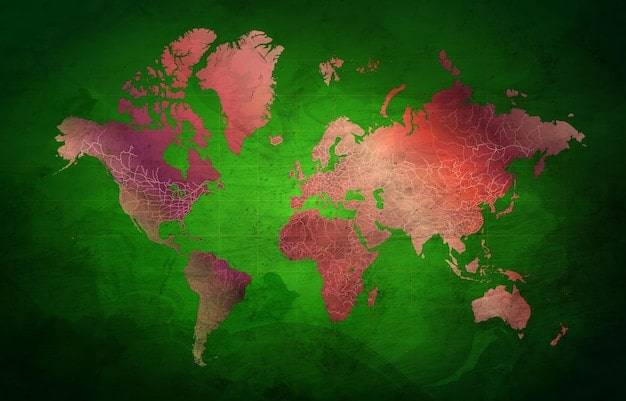Diplomatic Fallout: US Withdrawal from the ICC Analyzed

The potential diplomatic ramifications of the US withdrawal from the International Criminal Court (ICC) include strained relationships with allies who support the ICC, reduced US influence in international justice initiatives, and a weakening of the global commitment to accountability for war crimes and crimes against humanity.
The decision by the United States to withdraw from the International Criminal Court (ICC) has sparked significant debate and concern within the international community. Understanding what are the potential diplomatic ramifications of the US withdrawal from the International Criminal Court? requires a careful examination of the complex web of relationships, treaties, and shared values that underpin global diplomacy.
Understanding the US Withdrawal from the ICC
The United States’ relationship with the International Criminal Court (ICC) has been complex and often fraught with tension. While the US has, at times, cooperated with the ICC on specific cases, it has never fully embraced the court’s jurisdiction, particularly over US nationals.
The official withdrawal, finalized under the Trump administration, marked a significant departure from the international legal framework and raised serious questions about the US commitment to international justice.
Historical Context of the US-ICC Relationship
The US played a role in the initial discussions that led to the creation of the ICC, but ultimately did not ratify the Rome Statute, the treaty that established the court. Concerns over the potential for politically motivated prosecutions and the protection of US sovereignty have been central to this decision.
Key moments in this complex relationship include the negotiation of Article 98 agreements (which seek to prevent US nationals from being surrendered to the ICC) and the imposition of sanctions against ICC officials during the Trump administration.
Reasons Cited for the US Withdrawal
The US government has consistently voiced concerns that the ICC’s jurisdiction could be used to target US military personnel and officials, particularly in relation to actions taken during military operations abroad. This concern stems from the belief that the ICC could potentially pursue politically motivated cases against US citizens, undermining national sovereignty.
- Protecting US Sovereignty: A primary concern is the preservation of US sovereignty and the belief that the US justice system is best equipped to handle allegations of wrongdoing by its citizens.
- Preventing Politically Motivated Prosecutions: The US fears that the ICC could be used for politically motivated prosecutions, particularly against US military personnel.
- Ensuring Fair Trials: There are concerns about the fairness and impartiality of the ICC’s proceedings, particularly when dealing with cases involving US nationals.
In conclusion, the US withdrawal from the ICC is rooted in concerns about sovereignty, potential political interference, and the protection of its military personnel. This decision reflects a long-standing skepticism toward international judicial bodies and a preference for national legal mechanisms.

Impact on US Alliances and Partnerships
The US withdrawal from the ICC has undoubtedly strained relationships with key allies, particularly those who are strong supporters of the court and view it as an essential instrument for international justice. This divergence in perspective creates friction and challenges the spirit of cooperation on which many alliances are built.
The impact extends beyond mere disagreement; it raises questions about shared values and the commitment to a rules-based international order.
Strained Relations with European Allies
Many European nations are staunch supporters of the ICC and view it as a critical institution for holding individuals accountable for the most serious international crimes. The US withdrawal has been met with disappointment and concern in Europe, leading to increased tensions and diplomatic challenges.
This divergence in approach has complicated cooperation on issues related to international justice and human rights.
Challenges in Cooperation on International Justice
The US withdrawal from the ICC poses significant challenges to international cooperation on issues such as war crimes, crimes against humanity, and genocide. Without US support, the ICC’s ability to investigate and prosecute these crimes is weakened, potentially undermining global efforts to ensure accountability.
- Reduced Information Sharing: The US may be less inclined to share intelligence and evidence with the ICC, hindering its investigations.
- Limited Extradition Cooperation: The US is unlikely to cooperate in the extradition of individuals to the ICC, making it more difficult for the court to bring perpetrators to justice.
- Decreased Financial Support: Although the US was not a major financial contributor, its withdrawal signals a lack of support for the court’s operations.
In summary, the US withdrawal from the ICC has had a tangible impact on its alliances and partnerships, particularly with European nations. These strained relationships pose challenges for cooperation on international justice and undermine the collective effort to hold perpetrators of serious international crimes accountable.
Reduced US Influence in International Justice
The withdrawal from the ICC has diminished the United States’ standing and influence in the realm of international justice. By distancing itself from the court, the US has forfeited its ability to shape the ICC’s agenda and influence its policies from within.
This reduced engagement has far-reaching consequences for US leadership on human rights issues and its ability to promote accountability for atrocities around the world.
Loss of a Seat at the Table
As a non-member state, the US no longer has a direct voice in the ICC’s decision-making processes. This means that the US cannot directly influence which cases the court investigates, which policies it adopts, or how it allocates its resources.
This loss of influence limits the US ability to ensure that the ICC operates in a manner consistent with its interests and values.
Impact on Human Rights Advocacy
The US has historically been a leading advocate for human rights and international justice. However, its withdrawal from the ICC has undermined its credibility in this area, making it more difficult for the US to effectively promote human rights abroad. This is especially true when criticizing other nations about possible participation in war crimes, if the U.S. is not willing to be investigated itself.
- Diminished Moral Authority: The US withdrawal has raised questions about its commitment to international justice, weakening its moral authority on human rights issues.
- Reduced Leverage: The US has less leverage to influence other countries to cooperate with international justice mechanisms.
- Increased Scrutiny: The US is likely to face increased scrutiny of its own human rights record, particularly in relation to its military operations abroad.
To conclude, the US withdrawal from the ICC has significantly reduced its influence in international justice, limiting its ability to shape the court’s agenda and undermining its credibility as a global human rights advocate. This diminished role has far-reaching consequences for US foreign policy and its ability to promote accountability for atrocities around the world.
Weakening of Global Accountability Efforts
The US withdrawal from the ICC sends a powerful signal that undermines the global effort to hold individuals accountable for the most serious international crimes. This decision weakens the overall framework for international justice and makes it more difficult to deter future atrocities.
The implications extend beyond the US, potentially emboldening other nations to disregard international legal norms and resist accountability for their actions.
Undermining the ICC’s Legitimacy
The US, as a major global power, wields considerable influence on the international stage. Its withdrawal from the ICC casts doubt on the court’s legitimacy and weakens its ability to function effectively. This is particularly concerning given that the ICC relies on the cooperation of states to carry out its investigations and prosecutions.
The US withdrawal may also embolden other states to withdraw from the ICC or to refuse to cooperate with its investigations.
Potential for Impunity
Without the threat of ICC prosecution, there is a risk that perpetrators of serious international crimes will be emboldened, knowing that they are less likely to be held accountable for their actions. This is especially concerning in situations where national justice systems are weak or unwilling to prosecute such crimes.

- Reduced Deterrence: The US withdrawal weakens the deterrent effect of the ICC, potentially leading to an increase in international crimes.
- Limited Recourse for Victims: Victims of atrocities may have fewer avenues for seeking justice and redress.
- Erosion of International Norms: The US withdrawal undermines the norm of individual criminal responsibility for serious international crimes.
In conclusion, the US withdrawal from the ICC has profound implications for the global effort to hold individuals accountable for the most serious international crimes. It weakens the ICC’s legitimacy, increases the potential for impunity, and undermines the broader framework for international justice.
Alternatives to ICC Engagement
Given the US concerns about the ICC, it is important to consider alternative approaches for promoting international justice. These may involve supporting other international tribunals, strengthening national justice systems, or pursuing diplomatic initiatives to address human rights abuses.
A comprehensive approach is needed to ensure that perpetrators of serious international crimes are held accountable, regardless of whether the US is a member of the ICC.
Supporting Other International Tribunals
The US could increase its support for other international tribunals, such as the International Court of Justice (ICJ) and ad hoc tribunals established to address specific conflicts. These tribunals provide alternative venues for prosecuting individuals accused of war crimes, crimes against humanity, and genocide.
Increased US support could include financial contributions, technical assistance, and political backing.
Strengthening National Justice Systems
One of the most effective ways to promote international justice is to strengthen national justice systems so that they are capable of prosecuting serious international crimes. This involves providing training, resources, and technical assistance to help national courts investigate and prosecute these crimes effectively.
The US could play a leading role in this effort by providing support to countries that are committed to strengthening their national justice systems.
Diplomatic Initiatives and Sanctions
The US can also use diplomatic initiatives and sanctions to promote accountability for human rights abuses. This involves engaging in dialogue with countries where abuses are occurring, imposing sanctions on individuals and entities responsible for these abuses, and supporting international efforts to investigate and document human rights violations.
By using a combination of these tools, the US can help to create a climate of accountability and deter future abuses.
Future of US Foreign Policy and the ICC
The future of US foreign policy and its relationship with the ICC remains uncertain. A change in administration could lead to a reassessment of the US position, potentially paving the way for renewed engagement with the court. However, any such shift would likely require addressing the underlying concerns that led to the US withdrawal in the first place.
The path forward will depend on a complex interplay of political, legal, and diplomatic considerations.
Potential for Re-engagement
A future US administration could choose to re-engage with the ICC, either by formally rejoining the court or by pursuing a more cooperative relationship as a non-member state. This would require addressing the concerns about sovereignty and politically motivated prosecutions that have long shaped the US approach to the ICC.
Re-engagement could involve negotiating safeguards to protect US personnel and ensuring that the ICC operates in a transparent and accountable manner.
Conditions for Cooperation
Even if the US does not formally rejoin the ICC, it could still pursue a more cooperative relationship with the court. This could involve sharing information, providing technical assistance, and supporting the ICC’s investigations in specific cases.
- Clear Guidelines: Establishing clear guidelines for cooperation to ensure that US interests are protected.
- Mutual Respect: Fostering a relationship of mutual respect and understanding between the US and the ICC.
- Shared Goals: Focusing on areas where the US and the ICC share common goals, such as combating genocide and war crimes.
In conclusion, the future of US foreign policy and its relationship with the ICC is uncertain, but there is potential for both re-engagement and increased cooperation. The path forward will depend on addressing the underlying concerns that have shaped the US approach to the ICC and finding common ground on issues of international justice.
| Key Point | Brief Description |
|---|---|
| 🤝 Alliance Impact | Strained relations with allies supporting the ICC. |
| 📉 US Influence | Reduced influence in global justice and human rights efforts. |
| ⚖️ Global Accountability | Weakened global commitment to prosecuting war crimes. |
| 🛡️ Alternatives | Exploring tribunals and national justice support. |
Frequently Asked Questions (FAQ)
The U.S. withdrew due to concerns over sovereignty and potential politically motivated prosecutions against its military personnel, asserting its legal system is best suited to handle such allegations.
The withdrawal has strained relations, particularly with European allies who strongly support the ICC, creating challenges for cooperation on international justice and human rights.
The U.S. has diminished influence in international justice, limiting its ability to shape ICC policies and undermining its credibility as a global advocate for human rights.
Yes, a future administration could potentially re-engage, either by rejoining or pursuing a more cooperative relationship, contingent on addressing the underlying concerns about sovereignty.
Alternatives include supporting other international tribunals, strengthening national justice systems, and using diplomatic initiatives and sanctions to promote accountability for human rights abuses.
Conclusion
In conclusion, the US withdrawal from the International Criminal Court carries significant diplomatic ramifications, affecting alliances, reducing US influence in international justice, and potentially weakening global accountability efforts. While alternative approaches exist, the long-term impact on US foreign policy and the pursuit of international justice remains a complex and evolving issue.





